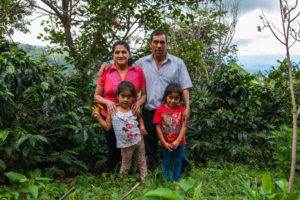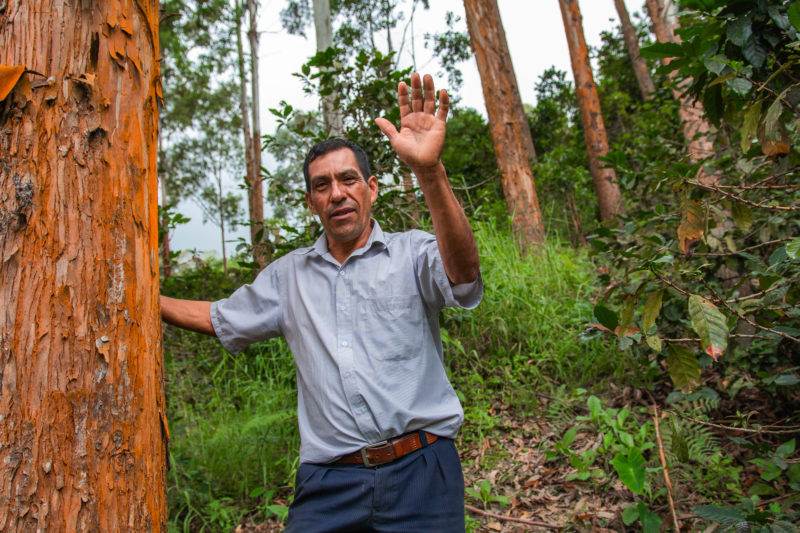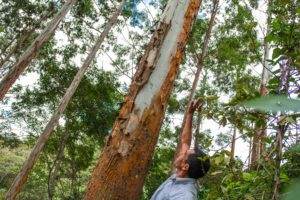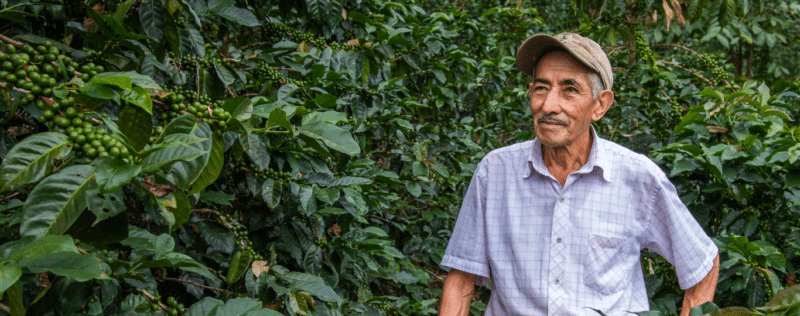Tackling the threat of deforestation and creating decent living conditions for ageing farmers
Melanio Saavedra has had seven children, plants a hundred trees a year, and —although he has not yet considered writing a book — has already written a better future for himself and his community.
Located in the northeast of Peru, Santa Fe is a vibrant coffee-growing centre characterised by its green landscapes and bright blue skies. But, as Melanio recalls, it wasn’t always like that.
“We sometimes suffered because there was not enough coffee. From one hectare of coffee, we would get 4 or 5 quintals, and that worried us, the family, as it was not enough and the price was low.”
At the time, Melanio and his fellow farmers thought a quick solution would be to have more extensive crop areas, and burned the forest to expand their farmland. But coffee is a product that needs particular weather to thrive, and with a lack of quality, it is exposed to changing prices. Unfortunately, the deforested hills of Santa Fe were not exactly the best setting and the trend of declining production continued as farmers started to explore the idea of migrating.

“Before, the people were cutting down trees. Without thinking about the future, they cut them down. We were worried because there was nothing anymore; people thought about migrating to the jungle.”
It is unusual that a single action provides so many solutions to our most pressing problems. But in this case, planting trees provides a host of benefits. Large trees provide shadow for coffee plants and regulate the weather, making it more suitable for growth. When their leaves fall, they become an organic fertiliser that enriches the soil. Better weather conditions and soil produce better quality organic coffee that has a better price in the market. These benefits create a ripple effect, in which people stop burning the forest and instead nurture it, restoring and protecting the land. And better still, these same trees will also provide a long–term income for farmers, who are able to sell the wood when it matures, replant once again for future generations and save for their old age. Santa Fe is now greener than ever, and its future has never been clearer.

It is unusual that a single action provides so many solutions to our most pressing problems. But in this case, planting trees provides a host of benefits. Large trees provide shadow for coffee plants and regulate the weather, making it more suitable for growth. When their leaves fall, they become an organic fertiliser that enriches the soil. Better weather conditions and soil produce better quality organic coffee that has a better price in the market. These benefits create a ripple effect, in which people stop burning the forest and instead nurture it, restoring and protecting the land. And better still, these same trees will also provide a long-term income for farmers, who are able to sell the wood when it matures, replant once again for future generations and save for their old age. Santa Fe is now greener than ever, and its future has never been clearer.
“With the reforestation for coffee, today we can see some very beautiful landscapes. We have trees that our arms can’t reach round to embrace. What beautiful trees. We feel proud. Before, there was nothing, and for the coffee, it provides shade for it. We prune the trees, and now we have firewood, and the leaves make organic fertiliser for the coffee.”
Changing the landscape and the mindset has required a great investment of labour and financial resources, and a broadening of knowledge to enable sustainable tree management. Working with Practical Action, Melanio can now see that Santa Fe has a future and has started planting a hundred trees every year. And by following the Peruvian National Forestry Office (SERFOR) requirements, he ensures the planted trees are suitable for the environment. The cutting and sale of wood are also in line with the regulations, creating a cycle that renews the forest in a responsible and planned way.

“At first, with a small group, we joined the training. Some people told us that we were wasting our time, they didn’t believe us. Some of us did the training and made the most out of it. (…) We started from scratch to set up the plots. The work was hard, managing the (agricultural) levels. Now we see very good results. Seeing that the plots were very nice, several friends visited us, they saw the plots and asked how the project started, how the training was, how coffee was being cultivated and what was asked from us, how life has changed for good.”
Large scale change in Santa Fe has also required collaboration by farmers like Melanio, who took the lead and believed it was possible. But, as much as a single tree does not make a forest, he used this knowledge to create a renewed community spirit.
“This project united families; now, we are more like a family than ever before. When was that ever the case before? Now we talk, share among friends, and the friends who wanted to go to the jungle now have beautiful plots of land, good trees, they already have something to sell, and they are happy with life.”
Planting trees as a long-term savings alternative creates part of a sustainable and profitable future for coffee farmers based on the power of local co-operation and diversification. And with the vision of community leaders like Melanio, these initiatives become far-reaching and long-lasting, anchored in shared knowledge and values. And just as coffee and trees thrive in this part of Peru, so do its farmers and the generations to come.
Melanio Saavedra is a farmer participant of the Café Correct project, which focused on creating a fairer economy for the coffee farming families in Peru and Bolivia. It was funded by the European Union. This project took place in Peru and Bolivia during 2015-2019. Some farmers have continued working with Practical Action in new projects related to biodiversity conservation and circular economies.
Find out how we can support more people like Melanio become climate pioneers in their communities and spark change for hundreds of other people like him.
Learn more about this project

Eco-friendly farming techniques helped Peruvian and Bolivian coffee farmers to thrive
View the Project